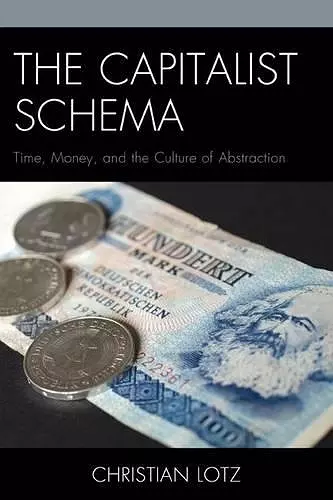The Capitalist Schema
Time, Money, and the Culture of Abstraction
Format:Paperback
Publisher:Lexington Books
Published:3rd Jun '16
Currently unavailable, and unfortunately no date known when it will be back

Christian Lotz argues that Immanuel Kant’s idea of a mental schematism, which gives the human mind access to a stable reality, can be interpreted as a social concept, which, using Karl Marx, the author identifies as money. Money and its “fluid” form, capital, constitute sociality in capitalism and make access to social reality possible. Money, in other words, makes life in capitalism meaningful and frames all social relations. Following Marx, Lotz argues that money is the true Universal of modern life and that, as such, we are increasingly subjected to its control. As money and capital are closely linked to time, Lotz argues that in capitalism money also constitutes past and future “social horizons” by turning both into “monetized” horizons. Everything becomes faster, global, and more abstract. Our lives, as a consequence, become more mobile, “fluid,” unstable, and precarious. Lotz presents analyses of credit, debt, and finance as examples of how money determines the meaning of future and past, imagination, and memory, and that this results in individuals becoming increasingly integrated into and dependent upon the capitalist world. This integration and dependence increases with the event of electronics industries and brain-science industries that channel all human desires towards profits, growth, and money. In this way, the book offers a critical extension of Theodor Adorno’s analysis of exchange and the culture industry as the basis of modern societies. Lotz argues—paradoxically with and against Adorno—that we should return to the basic insights of Marx’s philosophy, given that the principle of exchange is only possible on the basis of more fundamental social and economic categories, such as money.
This is, without question, an immensely significant contribution to the literature. I regard this book as one of the two or three most stimulating contributions to Marxian philosophy I have ever read. -- Tony Smith, Iowa State University
In this provocative study, Lotz rereads Adorno with and through Marx to develop a truly philosophical political economy. Arguing for a chronocritique of capitalism, Lotz shows how capitalism remains resilient and vibrant precisely because it constitutes a “framing” that conditions all social reality through the temporalization of money. Lotz also engages the most contemporary and wide-ranging critical theory to show the relevance and utility of a philosophically informed historical materialism. -- Eduardo Mendieta, Professor of Philosophy, Pennsylvania State University
The Capitalist Schema is an adventurous meditation by a gifted young philosopher on money, culture, time, and consciousness, written with the aim of returning critical theory to its roots in Marx's critique of political economy, reconceived via Adorno, Kant, and Heidegger. Anyone who wants to rethink Marx's theory of monetized society in a phase of continuing global crisis will find Christian Lotz’s work stimulating. -- David N. Smith, University of Kansas
Capital—understood in Marx’s sense as a social form constituted through “real abstractions” inseparable from money—schematizes our world. Everything has its price and capital’s purposes order everything. Christian Lotz brilliantly explores how that matters and how capital, especially as credit, binds us to the past and encloses even our cognitive and affective capacities. The Capitalist Schema establishes Lotz as an exciting voice in critical theory. -- Patrick Murray, Creighton University
The Capitalist Schema is a significant intervention into current reinterpretations of Marx’s theory of value. Eschewing the Hegelian heritage of much value-form theory, Christian Lotz gives a Kantian interpretation of the law of value. This states that the money form works along schematic lines. Money, for Lotz, establishes the conditions of possible experience and the social thinghood of objects. The book gives the clearest exposition yet of the real abstraction by which all things enter into relation with all other things. In so doing, it surpasses earlier attempts to outline the schematic quality of the capitalist exchange relation. Lotz’s is the most sophisticated and extensive development of the link between the law of value and the Kantian schematism yet given. Adopting critical distance from the early Frankfurt School, it represents a brilliant advancement of the theoretical project begun by Alfred Sohn-Rethel (1971). * Marx and Philosophy Review of Books *
ISBN: 9781498504621
Dimensions: 227mm x 152mm x 14mm
Weight: 290g
191 pages